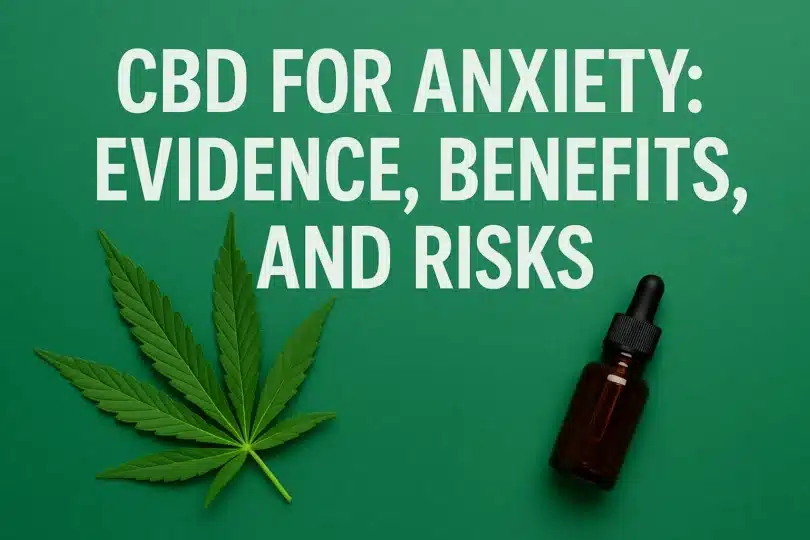Anxiety disorders affect hundreds of millions worldwide, making them the most common category of mental health conditions. While therapies and medications remain essential tools, many adults seek natural solutions to complement their care. Cannabidiol (CBD), a non-psychoactive compound from hemp, has rapidly become one of the most popular alternatives. By 2025, CBD products for stress and anxiety—from oils to gummies—are a multibillion-dollar industry. But does CBD truly work for anxiety, and is it safe? This CBD for Anxiety article examines the latest evidence, benefits, risks, and how CBD fits into modern stress management.
What is CBD?
CBD is one of more than 100 cannabinoids found in the cannabis plant. Unlike THC, CBD does not produce a “high.” Instead, it interacts with the body’s endocannabinoid system (ECS), a network of receptors that help regulate mood, stress response, pain, and sleep. CBD products are legal in most countries when derived from hemp with less than 0.3% THC, and they are widely available as oils, capsules, edibles, beverages, and topicals.
How CBD Works for Anxiety
CBD’s impact on anxiety appears to come from its modulation of multiple systems:
- Endocannabinoid receptors: Balances signaling in CB1 and CB2 receptors, reducing hyperactive stress responses.
- Serotonin receptors: Acts on 5-HT1A receptors, the same pathway targeted by many antidepressants.
- GABA activity: Enhances calming neurotransmission, reducing nervous excitability.
- Cortisol regulation: May lower levels of the stress hormone linked to chronic anxiety.
This multi-targeted approach helps explain why CBD shows promise across different types of anxiety, from social anxiety to generalized anxiety disorder (GAD).
Evidence and Research
Studies on CBD and anxiety are growing rapidly:
- Social anxiety: Clinical trials show CBD reduces anxiety in people during public speaking tasks, one of the most studied models of social stress.
- Generalized anxiety disorder (GAD): Early findings suggest CBD may reduce chronic worry and improve overall calmness.
- Sleep-related anxiety: CBD often improves sleep in people whose insomnia is linked to stress.
- PTSD: Some evidence suggests CBD may reduce intrusive thoughts and improve emotional regulation in people with trauma-related anxiety.
While results are promising, researchers note that most studies are small and more large-scale, long-term trials are needed. Still, real-world consumer use strongly supports CBD’s role in anxiety relief.
Best CBD Formats for Anxiety
- Oils/Tinctures: Absorbed quickly under the tongue, offering flexible dosing.
- Capsules/Softgels: Convenient, consistent dosing but slower onset.
- Gummies/Edibles: Popular for ease of use, though effects take longer to appear.
- Vapes: Provide fast relief but are not recommended for long-term use due to lung health concerns.
- Beverages: Infused drinks offer a social-friendly way to take CBD, though dosing may be less precise.
CBD for Anxiety: Dosage and Use
There is no universal dosage for CBD, as effectiveness varies by body weight, metabolism, and product quality. Most people start with 10–20 mg per day and increase gradually up to 50–100 mg as needed. Experts recommend starting low and tracking effects. Third-party lab-tested products are critical, as the CBD market is poorly regulated and quality varies widely.
Risks and Side Effects
CBD for Anxiety is generally safe, but side effects may occur:
- Fatigue or drowsiness
- Dry mouth
- Digestive upset
- Potential interactions with medications (especially those affecting the liver)
Consumers should consult healthcare providers before combining CBD with prescription medications. Another risk is inconsistency—studies show that many CBD products on the market are inaccurately labeled, with some containing less CBD (or more THC) than advertised.
Everyday Integration
CBD can be integrated into routines much like other supplements. Oils or capsules in the evening may support both anxiety reduction and sleep. Gummies or beverages during the day can help with situational stress. Some users combine CBD with adaptogens like ashwagandha or calming amino acids like L-theanine for enhanced results. The key is consistency, quality, and tailoring use to individual needs.
Closing
CBD has rapidly moved from fringe to mainstream, and in 2025 it remains one of the most promising natural remedies for anxiety. By acting on multiple pathways—serotonin, GABA, and the endocannabinoid system—it provides gentle but meaningful relief for stress and worry. While not a cure-all, CBD offers a safe, accessible, and versatile tool for people seeking natural ways to manage anxiety. With careful selection of high-quality products, it can be an important part of a balanced stress-management plan.

